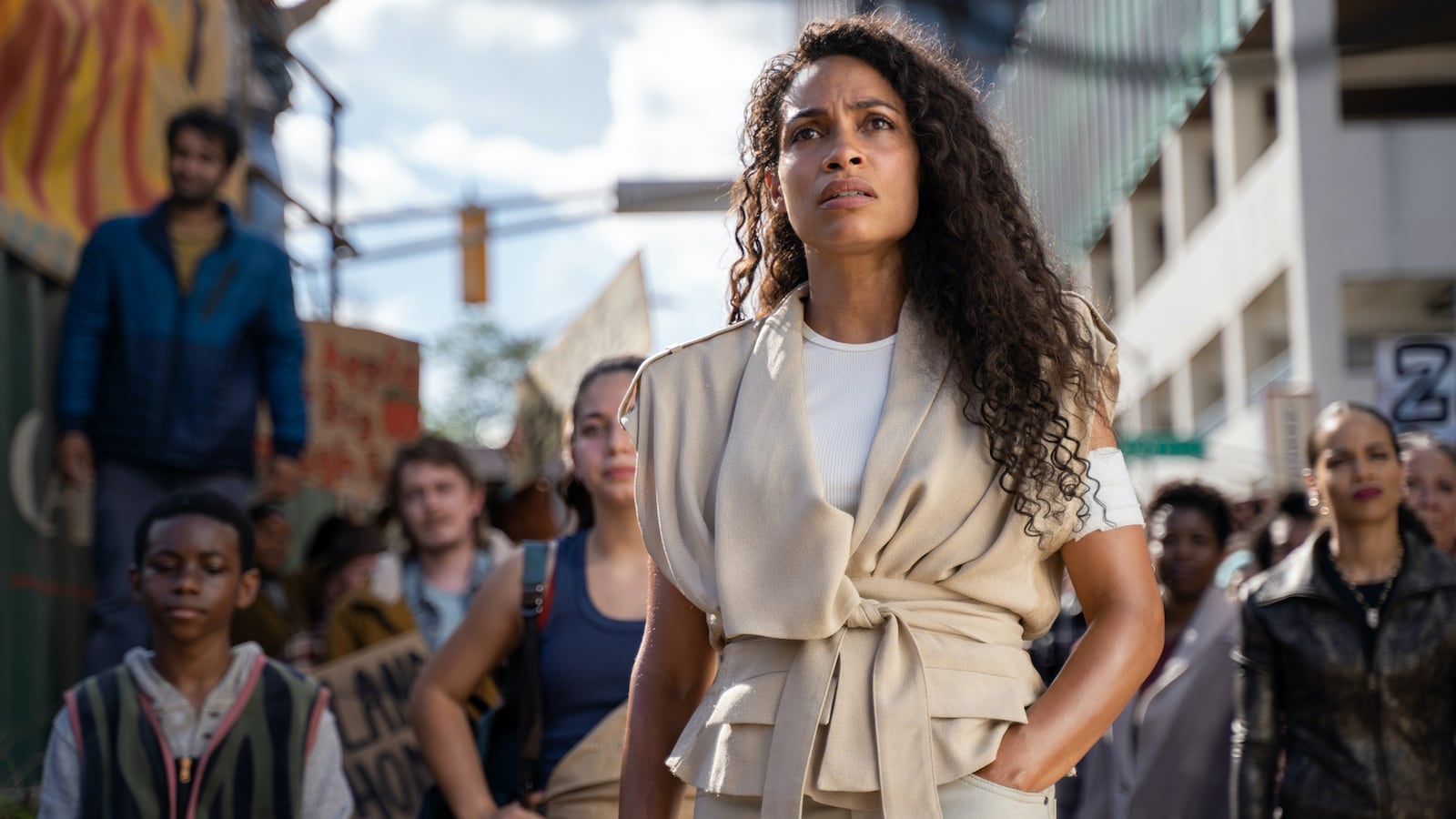During the 2010s, nobody was safe from Hollywood’s obsession with stories set in a post-apocalyptic dystopian future. Whether it was TV (The Walking Dead), film (The Hunger Games, Divergent, The Maze Runner), or video games (The Last of Us), it seemed like every other month we were bombarded with these bleak doomsday tales.
That craze has died down since the Divergent franchise failed to make a profit and never completed its series of films. Given that welcome break from the genre and, obviously, the current state of the world, HBO Max’s new four-part limited series DMZ, based on the Vertigo comics of the same name by Brian Wood and Riccardo Burchielli, seems to come at an appropriate time. But unfortunately it falls within the same lines of many generic stories of its type—though it presents slithers of potential.
Set in New York City eight years after a second civil war that has resulted in Europe seizing control of parts of the United States, the series follows medic Alma Ortega (Rosario Dawson) as she navigates a militarized Manhattan—which has been renamed the DMZ —to find her estranged son, Christian. The city has been completely decentralized, leaving everyone to their own devices.
Ample militarized gangs from different communities fight to seize control over the Last of Us-esque borough. Spanish Harlem Kings run the Upper West Side, led by mobster and populist Paco Delgadeo (Benjamin Bratt), and the Asian community in Chinatown is led by Wilson Lee (Hoon Lee). Alma, who has prior connections to the leaders of oppositional sides, finds herself caught in the middle of a much larger political picture. As she creates close ties within the community of the DMZ and becomes somewhat of an influential figure, she is dubbed a nickname: Z.
In the hands of any white showrunner, this Big Apple-set dystopia would’ve been as diverse as one of those aforementioned, very white Divergent movies. Thankfully, when you have pilot director and executive producer Ava DuVernay attached, you know diversity and, even in this dystopian fantasy world, authenticity come above anything else.
In the case of DMZ, that elevates your immersion in the setting. The series is as diverse as the city it’s set in. Though several groups have segregated in some capacity, when they’re all coming together you’re transported to a wide array of color that accurately reflects the real New York.
Despite the brief moments of community, the atmosphere is full of short-tempered aggression, as one would expect in a war zone. The series doesn’t shy away from displaying the brutal nature of unlawful men and how consequential violence can be, especially since it’s primarily set through the eyes of a medic whose hopeful heart never changes no matter how ruthless things get around her.
Series writer/creator Roberto Patino is given the difficult task to condense 72 issues into a four-part episodic release, and that’s where DMZ falls short. The pilot immediately thrusts you into Alma’s plight with little elaboration on the world of the DMZ. As Alma explores the wasteland of the DMZ, the show awkwardly takes on the familiar aesthetic of your everyday zombie apocalypse wasteland, which is odd since there’s no zombies in tow. However, it is a good vision board for what HBO Max wants The Last of Us series to look like.
Outside of Alma’s narrative, perspectives shift around: between her; Parco; his right hand, Skel (Freddy Miyares); and two precocious kids, Odi (Jordan Preston Carter) and Nico (Venus Ariel), whose entire upbringings were in the DMZ. As their worlds interconnect, the series tacks on far too many threads that go unresolved or seem pointless outside of the purpose of padding out the runtime.
Nico and Odi, as cute and at times intense their subplot adventures are, are given far too much screen time compared to their impact on the larger story. Still, though the initial two episodes seem unfocused and rushed, they do keep you engaged, thanks to the humanistic characterization of Alma and the relationship she attempts to have with her son Christian.
The ensemble cast brings their A-game, serving committed and powerful performances that keep the series engaging even when it seems too redundant and overfamiliar in terms of story. Rosario Dawson, especially, delivers a hella inspirational and poignant turn as Alma/Z. No matter how animalistic people get around her, she retains a captivating and endearing attitude. If there’s one thing the series does a fantastic job of doing, it is developing her arc as a simple medic on a mission to become a beacon of hope at a time people needed most.
She delivers one of the first great performances I’ve seen in a limited series this year thus far, which shouldn’t be a surprise: Dawson is a natural performer who always commits all-out to a role. The same can be attributed to Bratt as Parco, who oozes swagger whenever he’s around his men while also remaining a genuine, unpredictable threat who keeps you on your toes. Whenever he’s on screen, you get a wave of anxiety. His deadly influence is so strong you feel the danger for anyone he crosses.
It’s hard to shake the feeling that the series needs an additional episode or two. With more time, it could’ve been an aspirational dystopian story worth recommending. As it stands, it plays more like an adaptation channeled through SparkNotes than it feels like a complete, fleshed out narrative. It might have even turned out better as a feature.
The series is chock full of bone-chilling, strong character moments and intriguing twists that keep you hooked, but it comes at the expense of an incongruent story that is at times way too predictable for its own good. For something that comes from pretty dense source material, DMZ borrows way too much material from other better dystopian, or heck, New York crime stories. And when that doesn’t work out, it over-relies on the same constant flashbacks.
I give DMZ props for being short and straightforward, but it ultimately suffers from its fast-paced storytelling when there’s so much lore to dig through that could have led to something as epic as it deserves to be.






